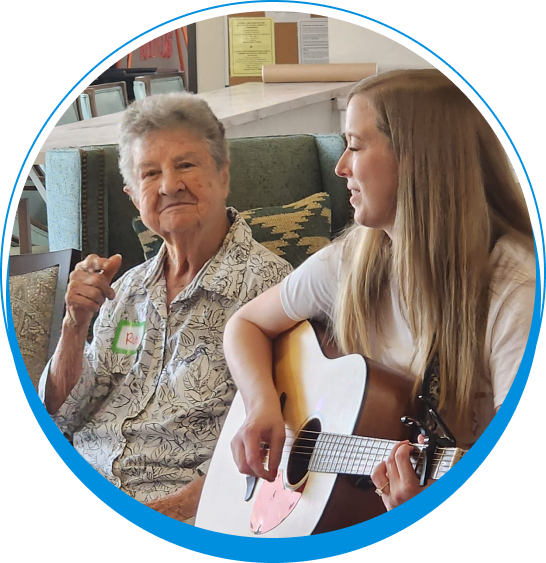We’ve talked about how to read your loved one’s unwanted behaviors as non-verbal communication: they are coping and reacting the best they can with the abilities they still have. In this post, we’ll dig deeper into four of these specific behaviors – wandering, rummaging, hoarding and packing – walking through triggers, warning signs and interventions. Sometimes, these behaviors will need your attention, reassurances and redirections, and sometimes they won’t. Your response can make the situation better or worse.
In general, the risk factors for these unwanted behaviors include:
- Being in a new or changed environment: moving away from home, being in the hospital or doctor’s office, seeing people in masks, or being in empty restaurants
- Undiagnosed pain: headaches, toothaches, blisters, arthritis flare-ups, for example
- Other physical problems such as shortness of breath or a urinary tract infection, as well as side effects from medication
- Boredom or loneliness
- Being approached by someone with a negative attitude, or mirroring others’ moods
- A phenomenon known as sundowning (a routine increase in agitation in late afternoon)
- Being treated like a child, which increases frustration
- The simple fact that they are not in control of their emotions and lack impulse control
Wandering
59% of people with Alzheimer’s or a related dementia will get lost, usually close to home (within less than 1/10 of a mile) while doing normal activities. And while it’s common, it’s not to be taken lightly: 46% may die if not found within 24 hours. Complicating this is the fact that a person with dementia who wanders doesn’t cry out for help or leave behind physical clues.
Consider enrolling in a wandering response service like MedicAlert with Wandering Support that you can call in these circumstances, along with taking the following actions:
- Search the immediate area where person was last seen
- Call the police. Tell them the person is memory-impaired and at risk
- Provide a recent photo and describe what they were wearing and any defining characteristics
- Have friends and family continue to search for your loved one while you stay by phone
- Call hospital emergency rooms
- When your loved one is found, inform the police and MedicAlert with Wandering Support if you are enrolled
To help prevent any future wandering activities, you can:
- Try to understand the reason for the wandering/pacing
- Assist the person in finding their room, dining room, or bathroom as needed
- Redirect to another room/area of house
- Offer frequent snacks, finger foods and fluids to help prevent possible dehydration
- Provide and encourage the person to join activities as a way of redirecting
- Encourage wandering in a safe place if they are bored, restless or agitated
Rummaging
Rummaging is a coping mechanism: when speech and comprehension skills decline, people with dementia find other ways to interact and communicate. For example, when someone with dementia is hungry but can’t say that, they might rummage.
When someone with dementia is rummaging, they might be looking for “something lost,” but not know what that is. They might also be responding to sensory needs, reacting to curiosity, boredom or nervousness, or even looking for a way to exert control.
People accustomed to being busy may rummage because they feel at loose ends, and rummaging through drawers and closets or moving furniture around may remind the person of productive things they did in the past like cleaning or organizing.
To address rummaging behavior, try the following interventions:
- Identify why they are rummaging – are their basic needs being met?
- Provide a meaningful and familiar activity such as cleaning countertops, sorting/folding laundry or setting the table for meals
- Provide rummage boxes in areas throughout the house, especially areas they frequent
- Boxes could be filled with safe, random things found around the house, items from their past (sewing, tools, costume jewelry, pictures), or specific sensory items, like plastic balls of different sizes and textures
Hoarding
Persons with dementia will often collect food, paper products such as napkins and tissue paper, or objects such as small stones, flowers or plants. They could potentially collect anything – socks, silverware or condiment packets.
They may carry these objects around all day without ever eating or using them, usually tucking them away in clothing, pockets, drawers or closets. Do not attempt to take the objects away unless they are dangerous, such as knives or scissors. Check for objects each evening after the person is asleep and remove them.
Packing
The impulse to pack bags and get ready to go home are common behaviors for persons with dementia. They have probably lived in many houses over their lifetime, and are getting these various homes confused in their minds.
Talk to them about home, trying to understand what “home” stands for, whether it’s a place or a feeling. Ask them, “What is your favorite thing to do at home? What room is your favorite? Who lives there?” Be sure to follow their lead and go with the flow, using the conversation to redirect if needed.
To prevent and manage packing behaviors:
- Remove “triggers” that suggest it’s time to go, such as shoes, purses and coats by the door, and make sure luggage is out of sight
- Outside, park cars away from windows to keep them out of sightlines
- If they have packed bags, unpack them when they are asleep
- If they are set on leaving right now:
- Ask them to help you with something before they go
- Take them or go with them; usually a drive or a walk will either distract and redirect them, or it can “reset” their mind so that when you return home they are in the right place
For all unwanted behaviors, don’t underestimate the power of redirection, which involves distracting the person from what they are upset about long enough for them to forget about it. People with dementia can only hold one thought at a time, and distracting them with another thought eliminates what was upsetting them in the first place.
No matter what:
- Do not argue with the person
- Give repeated reassurances
- Offer favorite snacks, drinks and other distractions
- Change the environment as needed to reduce stimulation
- Be aware of what you are communicating in body language, tone of voice, emotions, and facial expressions
- Validate their emotions and meet them in their world
- Take care of yourself
Remember: All behavior has a purpose. We can’t change the person, but we can determine what unmet need they are reacting to and accommodate.
Learn more about dementia and caregiving by visiting our blog or calling our dementia care specialists at 817-877-1199.


